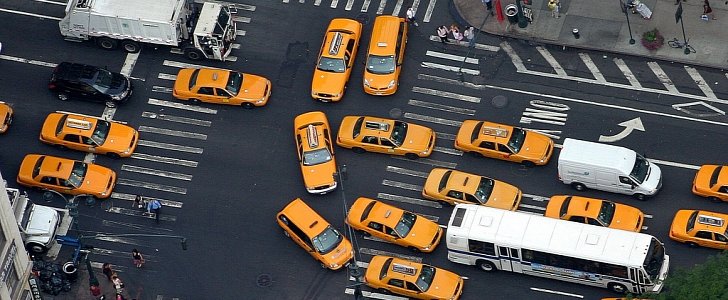Ever since the possibility of personal vehicles that can drive themselves stopped seeming so distant, most analysts were quick to point out that their advent might mark the cure to our congestion ailment.
To back the idea up, they postulated that fewer and fewer people would actually own a vehicle and that sharing them would become the norm. That meant less idle time for the cars which, instead of rotting away in a garage for most of the time as they do now, would be out on the road serving other people who actually need them.
Well, that sounds plausible, but there is a logical fallacy in there: if the same number of people needed the same number of cars at the same time as they do now, we'd have just as many cars on the roads even if they were driving themselves. The idea is to have more people inside fewer vehicles, and we've had something that offers precisely this for years: it's called public transport.
There's another aspect of AI-controlled cars that seems more likely to have an impact on the crowded urban streets: interconnected vehicles and a smart grid. With the variable taken out of the equation - that would be us, the humans - and the ability to communicate between themselves, the cars would be free to move at greater speeds and in a predictable manner. That means shorter gaps between them and a much more improved flow through intersections.
Don Elliott, a zoning consultant, and director at Clarion Associates in Denver is convinced that autonomous cars will only make things worse. “I’ve seen the blood run out of people’s faces,” he told Curbed. “For years, planners have been fighting for a 1 or 2 percent change in transportation mode [getting more people to use transit or bike instead of drive]. With this technology, everything goes out the window. It’s a nightmare.”
They fear that once driving won't actually be required to have a car zip around town, not only will people continue to use their vehicles, but others who previously couldn't drive a car themselves will begin to use one.
The same publication quotes Shannon McDonald, an architect, assistant professor at Southern Illinois University-Carbondale, and an expert in future mobility planning: “This [the three new technologies—automation, electrification, and shared mobility] will completely change us as a society. I think it’ll have the same transformational change as the introduction of the automobile.”
As always, the truth probably lies somewhere in the middle, but hoping that traffic jams will soon be a thing of the past - as some supporters of these three technologies claim - is simply wishful thinking. This isn't the kind of problem that can be sorted out with one silver bullet. Or even three.
Well, that sounds plausible, but there is a logical fallacy in there: if the same number of people needed the same number of cars at the same time as they do now, we'd have just as many cars on the roads even if they were driving themselves. The idea is to have more people inside fewer vehicles, and we've had something that offers precisely this for years: it's called public transport.
There's another aspect of AI-controlled cars that seems more likely to have an impact on the crowded urban streets: interconnected vehicles and a smart grid. With the variable taken out of the equation - that would be us, the humans - and the ability to communicate between themselves, the cars would be free to move at greater speeds and in a predictable manner. That means shorter gaps between them and a much more improved flow through intersections.
Don Elliott, a zoning consultant, and director at Clarion Associates in Denver is convinced that autonomous cars will only make things worse. “I’ve seen the blood run out of people’s faces,” he told Curbed. “For years, planners have been fighting for a 1 or 2 percent change in transportation mode [getting more people to use transit or bike instead of drive]. With this technology, everything goes out the window. It’s a nightmare.”
They fear that once driving won't actually be required to have a car zip around town, not only will people continue to use their vehicles, but others who previously couldn't drive a car themselves will begin to use one.
The same publication quotes Shannon McDonald, an architect, assistant professor at Southern Illinois University-Carbondale, and an expert in future mobility planning: “This [the three new technologies—automation, electrification, and shared mobility] will completely change us as a society. I think it’ll have the same transformational change as the introduction of the automobile.”
As always, the truth probably lies somewhere in the middle, but hoping that traffic jams will soon be a thing of the past - as some supporters of these three technologies claim - is simply wishful thinking. This isn't the kind of problem that can be sorted out with one silver bullet. Or even three.

